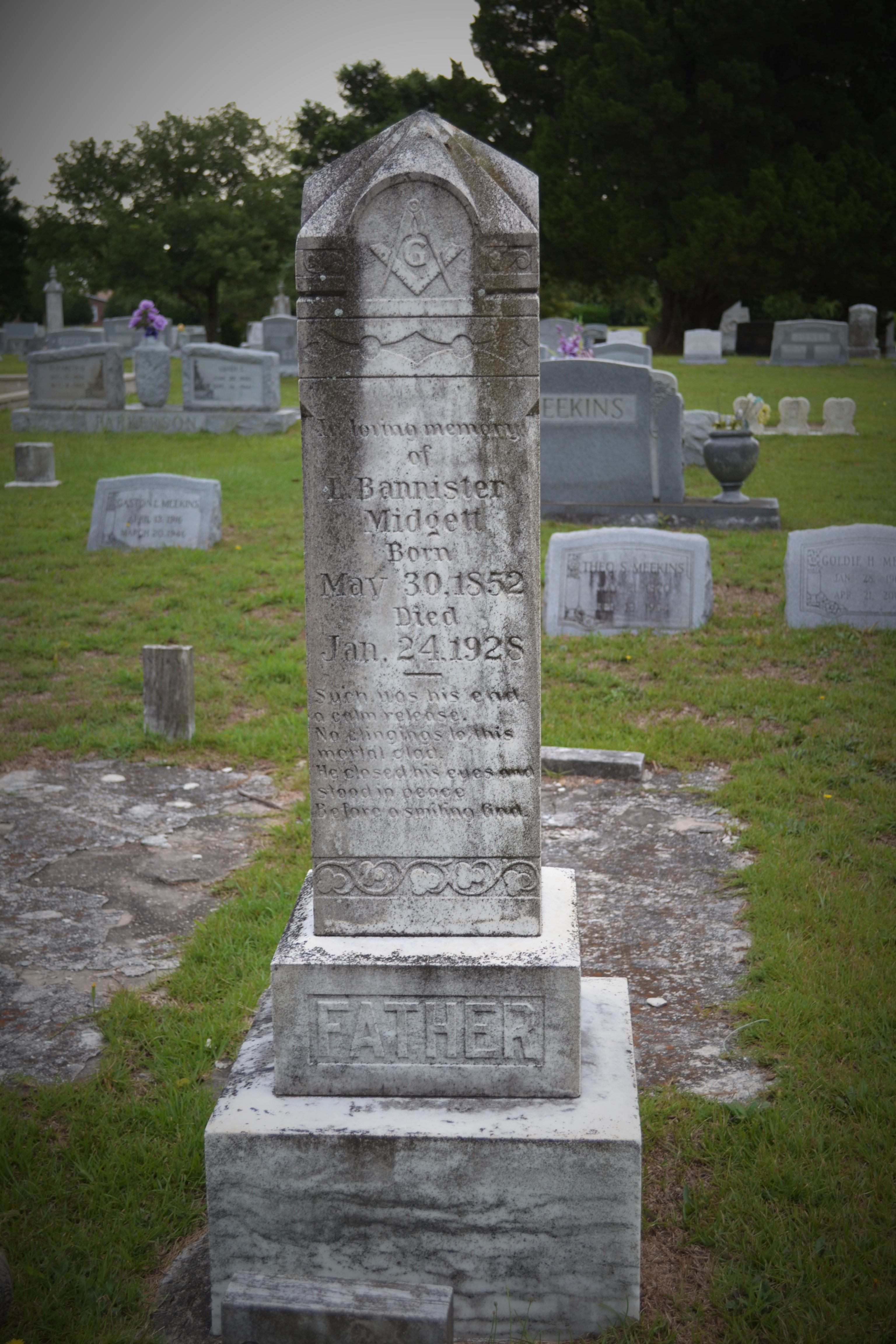Midgett, Little Bannister, IV
May 30, 1852–January 24, 1928
 Little Bannister Midgett IV was keeper (1879–94) of U.S. Life-Saving Service Chicamacomico and New Inlet stations. He was also chief boatswain's mate and officer-in-charge at the Chicamacomico Coast Guard Station (1894–1916). MIdgett was born in Clarks, N.C.(now Salvo) of English ancestry. He was the son of Dorothy Payne and Little Bannister Midgett III.
Little Bannister Midgett IV was keeper (1879–94) of U.S. Life-Saving Service Chicamacomico and New Inlet stations. He was also chief boatswain's mate and officer-in-charge at the Chicamacomico Coast Guard Station (1894–1916). MIdgett was born in Clarks, N.C.(now Salvo) of English ancestry. He was the son of Dorothy Payne and Little Bannister Midgett III.
Young Midgett was living on the Outer Banks and coming of school age at the time of the Civil War. This made it difficult for him to receive a formal education. All of his life he felt this limitation, blaming it on the "treasonable neglect of the Confederacy to maintain schools during the Rebellion." In his teens and early twenties, he worked as a surfman and as a surf fisherman. Both vocations were difficult and dangerous.
In the 1870s the U.S. Life-Saving Service expanded its operations to include the North Carolina coast, constructing seven stations and placing the Outer Banks in the Sixth District. At that time, the stations went by number. According to the service's records, Midgett served for two seasons as a surfman in Life-Saving Station No. 20. On August 7, 1879, J. W. Etheridge, superintendent of lifesaving stations in the Sixth District, sent a letter to Sumner Kimball. He recommended Midgett as keeper of station No. 18. Kimball was the general superintendent of all lifesaving stations in the United States. Etheridge stated that "this man is considered to be the best surfman on the coast of North Carolina." Station No. 18 was Chicamacomico Station. It was built alongside two other stations on Hatteras Island under the Congressional Enactment of 1878. By 1878 Midgett had been named contractor and supervised the building of this station. On October 13, 1879, he was appointed keeper of Chicamacomico with a salary of four hundred dollars per year. He served there until 1888, when he transferred to New Inlet. In 1894 he was sent back to Chicamacomico. He was serving there when the Life-Saving Service and the Revenue Cutter Service formally merged and became the U.S. Coast Guard in 1915. Midgett never supported the fusion and claimed that it was "a shotgun wedding."
Midgett was a skilled seaman. He knew how to use an oar in a surfboat. Midgett's private logbook detailed his aptitude with lifesaving in addition to some shipwrecks he saved. In 1881, he rescued six survivors from the rigging of the hurricane-stranded Thomas J. Lancaster. When the George L. Fessenden broke into pieces off the Outer Banks in 1898, Midgett fired his Lyle gun, placing the line almost in the hands of the sailors hanging onto the boom. However, the seamen were unable to grab it because the vessel suddenly disintegrated, killing two crewmen with debris and knocking the others into the churning waters. Midgett, with his surfmen, heaved lines and succeeded in dragging three survivors from the surf.
In 1899, the "San Ciriaco" hurricane spawned in the southern oceans near the equator, bred on the islands of the Caribbean, and spent most of its mature life off the Outer Banks of North Carolina. THe hurricane destroyed numerous ships and marooned many sailors. Midgett and his crew worked to save sailors during this time. When the Aaron Reppard wrecked, they were able to save only three of its company. Midgett's logbook records the names of the vessels that were destroyed by the events. According to his logbook, Midgett's priority was to save shipwrecked sailors: "Regulations say you have to go out; regulations do not say anything about coming back."
Midgett was an active Republican politically. He was also active in the Methodist church in Chicamacomico, serving in many official capacities during his lifetime. He was a Master Mason and belonged to an Elizabeth City fraternity.
He married Sabrina Midgett of Chicamacomico on January 11, 1874. They had four sons and six daughters. Three of his sons—Etheridge, Dan, and Thomas—chose the U.S. Coast Guard as a career; two of his daughters married coastguardsmen. Midgett died in Manteo, where he and his wife were buried in Mount Olivet Cemetery.
References:
General Services Administration, National Archives and Records Service, Washington, D.C.: Nomination File of L. B. Midgett, 1879, Qualification File, 1879, from Assistant Inspector to Superintendent of Life-Saving, 6th Dist., October 1879, and Appointment File, 1879, Department of Transportation, U.S. Coast Guard, Public Affairs Division, Washington, D.C..
Ben Dixon MacNeill, The Hatterasman (1958).
David Stick, Graveyard of the Atlantic (1952) and The Outer Banks (1958).
Nell Wise Wechter, The Mighty Midgetts of Chicamacomico (1974).
Additional Resources:
Wright, David, and Zoby, David. Fire on the Beach: Recovering the Lost Story of Richard Etheridge and the Pea Island Lifesavers. New York: Oxford University Press. 2002. 28. http://books.google.com/books?id=JtiKkXvMENMC&pg=PA28#v=onepage&q&f=false (accessed July 10, 2013).
"Chicamacomico Station History." Chicamacomico Historical Association. 2009. http://www.chicamacomico.net/Station_History.htm (accessed July 10, 2013).
Image Credits:
Broyles, Colleen Sanders. Image of Little Bannister Midgett IV's Headstone, from "Little Bannister Midgett IV." Findagrave.com. https://www.findagrave.com/memorial/6320587/little-bannister-midgett (accessed November 21, 2023).
1 January 1991 | Wechter, Nell Wise